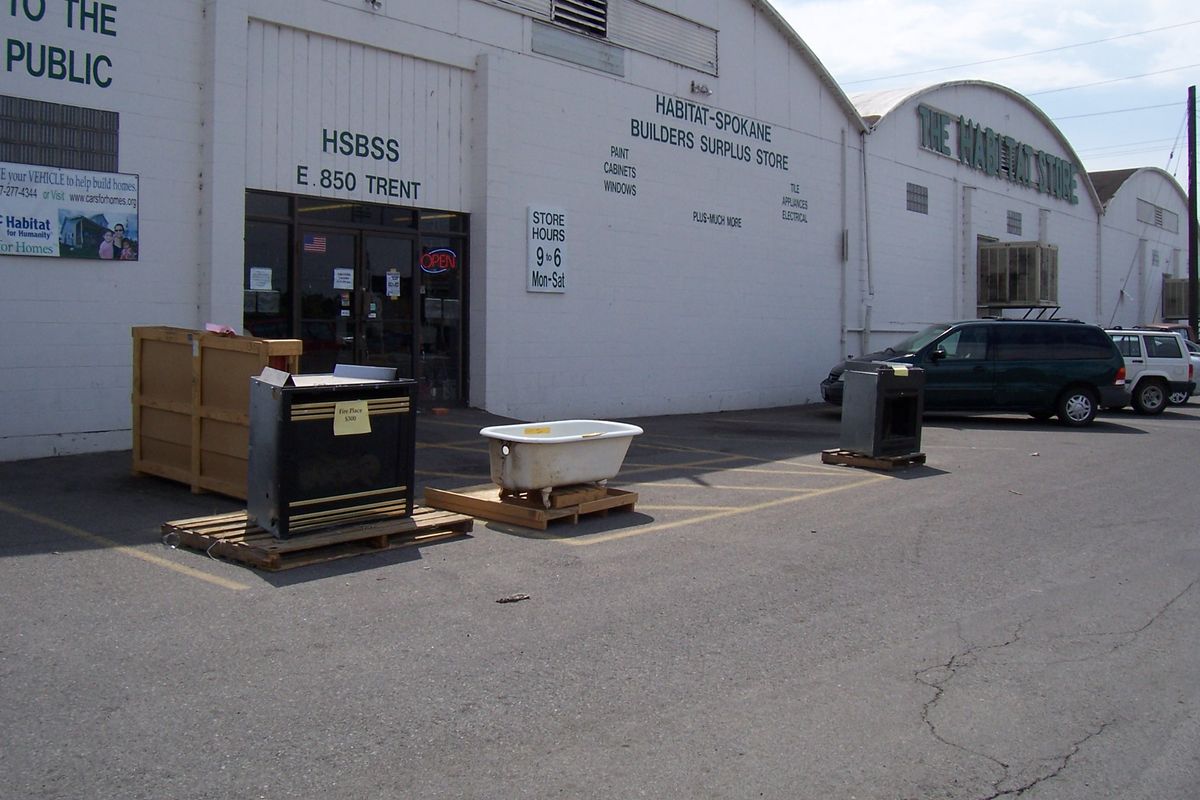Habitat for Humanity stores celebrate anniversaries
Trent, Valley locations continue to help community

Shoppers who buy building materials and other household items at Habitat for Humanity-Spokane’s stores don’t just come home with great deals.
Their purchases prevent tons of stuff from becoming garbage while helping raise money to build homes for people in need.
By collecting used materials that would otherwise be discarded and then selling them to the public at a discount, Habitat for Humanity-Spokane embraces the mantra of “recycle, reuse and repurpose.”
“A major goal for the Habitat Store and the Habitat Valley Store is to keep building materials out of the waste stream,” said Michone Preston, executive director of Habitat for Humanity-Spokane.
Since the first Habitat Store opened a decade ago, the non-profit has raised enough money to build 15 homes and has diverted more than 3,000 tons of building material from landfills and the incinerator.
In addition to selling used and new donated goods, the non-profit also reduces waste through other initiatives including recycling aluminum, cardboard, steel and wood; recommending customers to other thrift stores and recycling options if the Habitat stores cannot accept a particular donation; and by raising environmental awareness among its customers.
To celebrate its 10th anniversary, the Habitat Store near downtown Spokane and the Habitat Valley Store, which opened a year ago, will offer up to 30 percent off all store items Jan. 21-23.
Habitat for Humanity International opened its first store in Canada during the mid-1990s. Known as ReStores in other parts of North America, there are now hundreds of these outlets throughout the United States and Canada. The two Habitat stores in the Spokane area are among 16 in Washington state. When Habitat for Humanity-Spokane considered opening a store in the area, employees from Spokane traveled to Austin, Texas, to learn more about a thriving ReStore in that region.
When it opened 10 years ago, the Habit Store near downtown Spokane occupied only one-third of the building it leases on the corner of Trent Avenue and Hamilton Street. At that time, the most popular items included antiques, collectibles and other “eclectic” household goods, according to Preston. Since the outlet didn’t want to compete with other antique and thrift stores, it quickly expanded its product line with paint, tile, hardware and other goods.
Now everything from carpet, drywall and roofing material to appliances, windows and cabinets, easily fill up the building’s 30,000-square foot space.
“It’s a gold mine for people willing to put the time in to make something wonderful out of an old item,” Preston said.
Leaded windows, collectible furniture in good condition and doors with old architectural designs continue to be hot items, Preston said, but shoppers are also on the lookout for other deals. Earlier in January, for instance, the stores quickly sold out of new carpet, which was available for 75 cents a square foot. Generally, new materials are approximately 50 percent of retail and used items are only about 25 percent of the cost.
Inventory changes quickly at both Habitat stores, which employ about six full- and part-time employees and rely on about 75 volunteers. It’s also hard to predict what will be available at the stores since it’s based on donations from the businesses and the public, Preston said.
The largest volume of donations comes from retailers including Lowe’s, Home Depot and Costco. Instead of restocking some returned items, like gas grills or beds, these stores can donate them to the non-profit.
Local contractors and homebuilders also have been very generous, Preston said.
SRM Development, a Spokane-based company that builds commercial and residential properties throughout the western United States, recently provided $100,000 worth of surplus vinyl siding. All of it sold within 30 days, Preston said.
For some homebuilders, it makes more sense to donate leftover materials for a tax-deductible charitable donation instead of hauling everything to another project, she said. Habitat for Humanity-Spokane has a few trucks to pick up donations.
Donations have dwindled recently, however. Three years ago, the Habitat Store experienced a surge in charitable gifts. With the current recession and economic woes suffered by the homebuilding industry, Habitat for Humanity-Spokane now sees fewer donations despite the growing demand for used building materials and other items.
“We don’t have products sitting there,” Preston explained. “Our challenge is not customers – it’s donations. … During this recession, our customer base has really grown because households try to stretch their dollars. But because the activity of homebuilders has diminished, they have fewer donations to provide to the store.”
In addition to establishing relationships with retailers, Habitat for Humanity-Spokane likes to connect with households who recently have hosted garage or yard sales, and property owners who have obtained permits to remodel. The non-profit looks for specific items like cabinets of any style; eclectic furniture that are either antiques or are in almost new condition; newer sinks and tubs and other bathroom furnishings; and appliances that are black, stainless steel, white or off-white.
Instead of spending money on postage and to reduce the amount of paper they use, the non-profit e-mails customers about newest items and supplies that come in to the stores. Clientele include people looking for bargains, as well as collectors and those remodeling a bathroom, painting a room or fixing up their own homes. Many also want to be more “green” by taking used materials and giving them new life, Preston said.
“The products we sell aren’t necessarily energy-efficient, but our customers support the concept of reusing instead of throwing away,” Preston said.